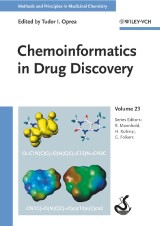Details

Chemoinformatics in Drug Discovery
Methods & Principles in Medicinal Chemistry, Band 23 1. Aufl.
|
250,99 € |
|
| Verlag: | Wiley-VCH |
| Format: | |
| Veröffentl.: | 06.03.2006 |
| ISBN/EAN: | 9783527604203 |
| Sprache: | englisch |
| Anzahl Seiten: | 515 |
DRM-geschütztes eBook, Sie benötigen z.B. Adobe Digital Editions und eine Adobe ID zum Lesen.
Beschreibungen
This handbook provides the first-ever inside view of today's integrated approach to rational drug design. Chemoinformatics experts from large pharmaceutical companies, as well as from chemoinformatics service providers and from academia demonstrate what can be achieved today by harnessing the power of computational methods for the drug discovery process.<br> With the user rather than the developer of chemoinformatics software in mind, this book describes the successful application of computational tools to real-life problems and presents solution strategies to commonly encountered problems. It shows how almost every step of the drug discovery pipeline can be optimized and accelerated by using chemoinformatics tools -- from the management of compound databases to targeted combinatorial synthesis, virtual screening and efficient hit-to-lead transition. <br> An invaluable resource for drug developers and medicinal chemists in academia and industry.<br>
Introduction<br> <br> VIRTUAL SCREENING<br> Chemoinformatics in Lead Discovery<br> Computational Chemistry, Molecular Complexity and Screening Set Design<br> Algorithmic Engines in Virtual Screening<br> Strengths and Limitations of Pharmacophore-Based Virtual Screening<br> <br> HIT AND LEAD DISCOVERY<br> Enhancing Hit Quality and Diversity Within Assay Throughput Constraints<br> Molecular Diversity in Lead Discovery: From Quantity to Quality<br> In Silico Lead Optimization<br> <br> DATABASES AND LIBRARIES<br> WOMBAT: World of Molecular Bioactivity<br> Cabinet -<br> Chemical And Biological Informatics Network<br> Structure Modification in Chemical Databases<br> Rational Design of GPCR-specific Combinational Libraries Based on the Concept of Privileged Substructures<br> <br> CHEMINFORMATICS APPLICATIONS<br> A Practical Strategy for Directed Compound Acquisition<br> Efficient Strategies for Lead Optimization<br> Chemoinformatic Tools for Library Design and the Hit-to-Lead Process: A User's Perspective<br> Application of Predictive QSAR Models to Database Mining<br> Drug Discovery in Academia - a Case Study<br>
"...a well-written, up-to-date, and practical book for medicinal chemists and computational chemists working in drug discovery."<br> Journal of Medicinal Chemistry<br> <br> "The volume is a valuable source of information for readers engaged in all areas of pharmaceutical research and development and medicinal chemistry."<br> Angewandte Chemie International Edition<br> <br> "... a unique and richly erudite text premised on a sub-layer of the scientific process ..."<br> Electric Review<br> <br> "...truly a delightful beginning and ending to a thoroughly superb reading that is worth the price of admission."<br> Journal of the American Chemical Society<br>
<b>Tudor I. Oprea</b> is Professor of Biochemistry and Molecular Biology and Chief, Division of Biocomputing at the University of New Mexico School of Medicine, Albuquerque (USA). He was born in Timisoara (Romania) where he did all his studies including his Ph.D. thesis under the supervision of Francisc Schneider. He was a post-doctoral fellow at Washington University with Garland Marshall, and Los Alamos National Laboratory with Angel Garcia. He worked six years at AstraZeneca in Sweden, before moving to New Mexico as full Professor in 2002. He received the Hansch Award from the QSAR and Modeling Society in 2002. He is interested in chemoinformatics, virtual screening, QSAR, and lead and drug discovery.
Chemoinformatics experts from large pharmaceutical companies, as well as from chemoinformatics service providers and from academia demonstrate what can be achieved today by harnessing the power of computational methods for the drug discovery process.<br> <br> From the contents:<br> <br> * Chemoinformatics in Lead Discovery<br> * Molecular Complexity and Screening Set Design<br> * Algorithmic Engines in Virtual Screening<br> * Pharmacophore-Based Virtual Screening<br> * Enhancing Hit Quality and Diversity<br> * Molecular Diversity in Lead Discovery<br> * In Silico Lead Optimization<br> * Using Databases and Libraries<br> * Combinational Libraries Based on Privileged Substructures<br> * Strategies for Directed Compound Acquisition<br> * Predictive QSAR Models in Database Mining<br> * Drug Discovery in Academia - a Case Study<br> <br> With the user rather than the developer of chemoinformatics software in mind, the successful application of computational tools for commonly encountered tasks is described in detail, and numerous real life examples are given. An invaluable resource for drug developers and medicinal chemists in academia and industry.<br>


















